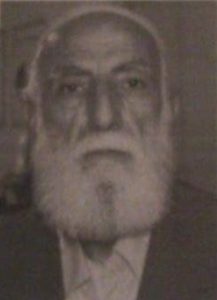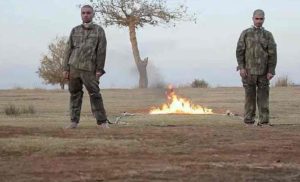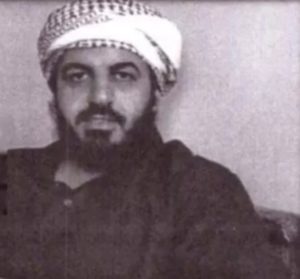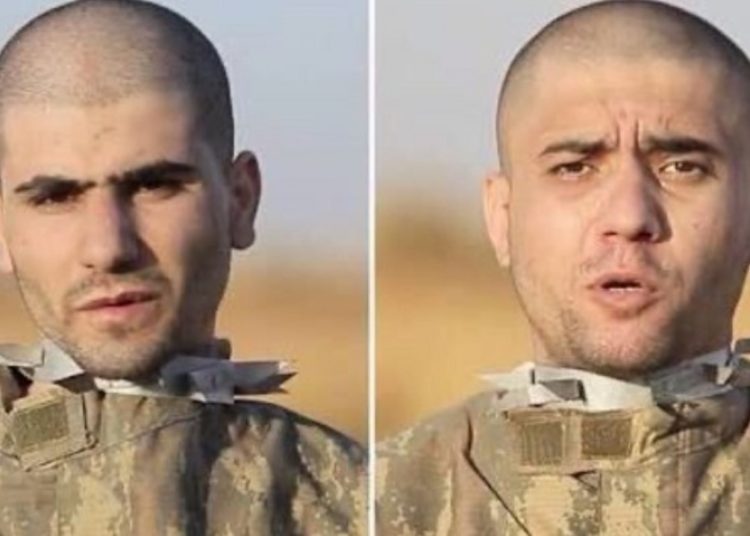Abdullah Bozkurt/Stockholm
The latest revelation that a judge for the Islamic State in Iraq and Syria (ISIS) who ruled for the burning alive of two Turkish soldiers in 2016 has lived in Turkey as a free man for years confirms once again the revolving door policy of the Turkish judiciary when it comes to its failure to crack down on armed jihadist groups.
Jamal Abdul Rahman Alwi, a 64-year-old Syrian national who worked for ISIS as a judge and ordered death sentences for many including captured Turkish soldiers Fethi Şahin and Sefer Taş, turned out to be living in Turkey as a refugee in the southeastern province of Gaziantep, where ISIS has active cells.
Alwi, who also goes by the nom de guerre of Abu Abdullah al-Sham, moved to Turkey when ISIS faced intensified Russian and US-led coalition strikes in Syria. He set up a shop in Gaziantep, took several wives and lived a normal life in Turkey, where nearly 4 million Syrians settled to escape the conflict at home.
He was already known to Turkish authorities, especially the intelligence agency, as he had worked in a jihadist-controlled area close to the Turkish border. In his absence an investigation into him was in the works in connection to the killing of the two Turkish soldiers, whose brutal death appeared in a video released on December 22, 2016. Three Turkish ISIS members — Talip Akkurt, Hasan Aydın and Muhittin Büyükyangöz — were also involved in executing Alwi’s order.

Turkish police identified Alwi as Cemal Alevi, using a Turkish spelling, in a 2017 report, shortly after the executions, although national intelligence agency MIT knew of him long before. Yet he was not touched when he decided to move to the Turkish province of Kilis on the Syrian border before he eventually settled in neighboring Gaziantep.
Alwi was detained on June 15, 2020, reportedly after police received an anonymous tip. Yet, the leak of his detention was only publicized in the government propagandist Sabah daily, owned by the family of President Recep Tayyip Erdoğan. The byline on the story on his detention was that of Nazif Kahraman, a man who was connected to Turkish intelligence. The spin story featured Alwi as a man who repented for his sins, begged the Turkish authorities for mercy, wept during his deposition and kept wiping tears from his eyes. According to Kahraman, Alwi said he was responsible for caring for five women and 10 orphans.
Alwi’s belated detention and the publicity of his arrest in Sabah coincided with the visit of Turkish intelligence chief Hakan Fidan and Erdoğan’s son-in-law Berat Albayrak to Libya, where Turkey was accused of sending jihadists, including ISIS fighters, to support the Tripoli-based Government of National Accord under the leadership of Fayez al-Sarraj against the Libyan National Army (LNA), led by Gen. Khalifa Haftar. The arrest of Alwi was most likely intended to give the impression that the Erdogan government was really cracking down on jihadists, not transporting them to Libya.
Documents show that Alwi had served as an ISIS judge in the Syrian city of Azaz, near the Syria-Turkey border, for three years, when the city was under the control of the jihadist group. He claimed he only worked as a judge part time and looked into cases of adultery, theft and land disputes, giving lighter sentences such as fines and flogging. He denied allegations that he had condemned the captive Turkish soldiers to death.

According to the case file at the Gaziantep 7th High Criminal Court, two witnesses came forward to identify Alwi as an ISIS judge. One was a Syrian named Mohammed Ali, who testified that he saw Alwi with ISIS fighters in the Syrian town of Al-Rai, a small settlement in the Aleppo Governorate. Ali claimed he was tried by Alwi in a religious court because he was informing Turkey about ISIS activities. In other words, he was an asset of Turkish intelligence and working as an informant.
“Alwi was overseeing cases of espionage, prisoners and opponents. Two Turkish soldiers were also brought before him [to stand trial]. When I saw the videos, I knew they were being executed,” he said in his statement. The second witness, identified as Syrian Azzaddin Ahmad, appeared to also be an asset for Turkish intelligence. He claimed he was sentenced to a death by Alwi over accusations that he was working for Turkey. He said he was released from a prison in Raqqah after an amnesty was issued by ISIS.
In Alwi’s case, a third witness whose identity was kept secret came forward to testify against the ISIS judge. In politically sensitive cases, it is well known that Turkish intelligence agency MIT enlists its own agents as secret witnesses to steer the case and obtain the politically desired result. This anonymous witness, code named HZT31706022, testified that Alwi was a judge for the rebels before 2013 and later joined ISIS. The witness said Alwi ruled for the execution of a Turk named Mahmut Derviş, who was secretly sending photos and videos using his smart phone to the secret witness.

The testimony suggests that Derviş’s handler who received photos, videos and info from him was a MIT agent. In his testimony the witness recalled watching two separate videos sent by Derviş that showed Alwi entering an ISIS courthouse before two captive Turkish soldiers were brought in for a hearing. In a quick trial, the Turkish troops were condemned to death and executed two hours later.
A reading of the case file makes it abundantly clear that Alwi has long been known to Turkish intelligence and that his cover in Turkey was deliberately blown by the agency after the the Erdoğan government needed publicity. When the mission was accomplished, he was ordered to be freed on March 2, 2021 by the court, which cited his family obligations and personal excuses to justify his release. To curry favor with the government, his lawyer argued that Alwi was in fact connected to the Sultan Selim Brigade, part of the Syrian Turkmen Brigades, armed and funded by the Erdoğan government.
Alwi’s travel ban was also lifted on June 26, 2021. He could have moved to Syria or Iraq but did not, probably feeling much safer in Turkey, where the authorities look favorably on jihadist networks.
His quiet release allowed him to resume his life in Gaziantep until news broke in September that a man who was accused of ruling for the execution of the Turkish soldiers was free in Turkey. Embarrassed by the news, Turkish authorities scrambled to detain him again, on September 17, 2021. He was formally arrested on charges that could have landed him in prison for the rest of his life.
Alwi is not a cleric. He’s a machinist by trade and helped maintain arms and ammunition for ISIS. When the Syrian civil war started in 2011, he joined armed rebellion groups in Azaz. Alwi had visited Turkey several times since 2012 and helped funnel money sent to accounts in Turkey from Europe and Arab countries for the jihadist cause.
He later worked for the Turkish-backed Nusra Front (Jabhat al-Nusra) and collected intelligence for the group. Under the command of Ahmad Obaid, Alwi worked in the village of Kafargan east of Azaz and oversaw logistics such as food distribution. His job in the Obaid group was to run logistics for a foreign fighters’ training camp located in the Syrian village of Shamarin, less than a kilometer south of the border with the Turkish province of Kilis. He made arrangements for the financing of foreign jihadists as well as procuring arms and ammunition.

Although he claimed he refused to join ISIS, his three children — Mohammed Enes, Kahka and Amer — were all killed while fighting for ISIS. His wife Nadia Wardi also confirmed that her husband worked as a judge. Police seized video footage in his home of people who were beheaded by the group. His commander, Ahmad Obaid, detained in Turkey in November 2019, is currently being tried on ISIS charges.
Alwi living as a free man in Turkey for years shocked the families of the slain soldiers. Pvt. Şahin’s father, Mehmet Şahin, told the media that Alwi might be connected to the Turkish state if he was allowed to stay out of prison despite accusations that he ruled for the execution of the two Turkish soldiers in Syria. He asked whether Alwi was working for the Turkish government and protected by it. He also said his son was still listed as a missing person in Turkish government records although the video clearly showed him burning to death.
According to his father, Şahin was working in the intelligence section of the gendarmerie, which has responsibility for law enforcement in Turkey’s rural and border areas. The Turkish gendarmerie, officially part of the Interior Ministry along with the police, has a military ranking and promotion system within the Turkish army. Şahin was believed to be assigned to infiltrate ISIS, and his cover was somehow blown when he was in Syria. The Facebook postings that showed jihadist messages were allegedly designed to facilitate his infiltration into the group.
The man who allegedly sent him to his brutal death was formally arrested after the Kilis Chief Public Prosecutor’s Office had to send the case file on the murder of the two Turkish soldiers to Gaziantep, where it was merged with another case against Alwi.
The fate of Turkish nationals who appeared in the video or were somehow connected to the execution resembles Alwi’s mind-boggling journey within the Turkish criminal justice system. Aydin was detained in Turkey multiple times, only to be released again. He remains a fugitive from the law. Akkurt, known as Abu Talha al Turki, also managed to escape the long arm of the Turkish law until he was killed in Syria in June 2018 by US-backed Kurdish group the Syrian Democratic Forces (SDF). Büyükyangöz also remains an elusive jihadist.

Another Turk named Ömer Yetek, who was believed to have facilitated the dissemination of the video and worked for the ISIS media arm, fled after his mysterious release from jail in Turkey. He was detained on February 4, 2018 in the Turkish capital and imprisoned pending trial. But Turkish authorities let him go on April 16, 2020. He remains a fugitive.
Turkey observers have little faith in the country’s criminal justice system in cracking down on ISIS and other jihadist cells given the Islamist policies of the Justice and Development Party (AKP) government, led by President Erdoğan.
Nordic Monitor has published multiple reports based on confidential documents and whistleblower accounts showing how Turkish intelligence worked closely with ISIS and al-Qaeda militants to promote the Erdoğan government’s political agenda.












